 RM100 for every vehicle sold. That is how much car manufacturers and importers are going to be asked to put into a road safety fund under a Transport Ministry proposal.
RM100 for every vehicle sold. That is how much car manufacturers and importers are going to be asked to put into a road safety fund under a Transport Ministry proposal.Vehicle manufacturers and importers said they were peeved that the authorities appear to be moving faster on this proposal than on adding meat to the national automotive plan.
Based on the sales of 400,835 cars last year, this scheme of contributing RM100 per vehicle sold would net the road safety fund a tidy sum of RM40 million. The proposal may also require insurance companies and other organisations to contribute to the fund which would further increase the coffers.
When the proposal comes into force, the money collected will be channelled towards a fund called the "Road Safety Trust". Money from the fund will be used to conduct road safety campaigns, and good news for Lim Kok Wing as he should be one of the beneficiaries.
Universiti Putra Malaysia Engineering Department head Prof Radin Umar Radin Sohadi said contribution schemes had been successfully implemented in developed countries. "In Australia, for instance, there is a body called the Transport Traffic Commission where insurance companies and other firms plough back money to educate motorists on road safety," he said. He said the additional funding had helped the Australian Government to launch several programmes that had significantly helped to reduce accidents and save lives. "For instance, they have structured programmes and equipment to teach schoolchildren road safety and the dangers of reckless driving. Their programmes have been very successful," added Radin.
Wow, Malaysia Boleh again!!!
When the Construction Industry and Development Board (CIDB) was set up to enhance the quality and skills of the construction industry, the same philosophy and ideology was preached. CIDB had collected billions of dollars of levy from contractors (0.25% of contract sum for each contract exceeding $500,000), and $250 from each worker who are required to be registered with CIDB.
However, over the two decades, what had been achieved is that CIDB has become a joint venture partner of some construction entities and are procuring projects in India and Sri Lanka. They are now scoping into Vietnam and Cambodia. But the industry is still plagued by poor quality, poor workmanship, poor safety and health environment and practices and project failures.
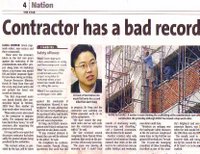
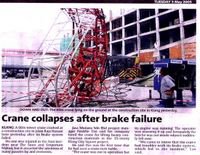



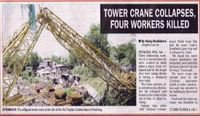





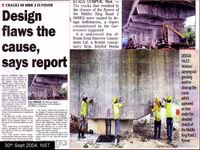
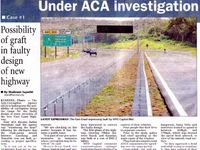








No comments:
Post a Comment